|
Books Should Be Free Loyal Books Free Public Domain Audiobooks & eBook Downloads |
|
|
Books Should Be Free Loyal Books Free Public Domain Audiobooks & eBook Downloads |
|
Top Authors |
|---|
|
Book type:
Sort by:
|
By: Martha Finley | |
|---|---|
 Elsie's Girlhood
Elsie's Girlhood
In the third book of Martha Finley's much-loved Elsie Dinsmore series, Elsie's life is traced from the tender age of 12 or 13 to the mature age of 21. Her life is not all sunshine and roses, but she is secure in the love of the Lord and her family. | |
 Elsie's Motherhood
Elsie's Motherhood
After the Civil War, Elsie and her family return to their home in the South, dealing with the upheaval that the Reconstruction Era brought during the years after the war. | |
 Elsie's Children
Elsie's Children
This book continues the delightful "Elsie Dinsmore" series. Elsie's children, introduced in the previous volume, live life, grow up, and encounter various problems of their own. Additional Proof Listeners: AlaynaMay & Rachel. | |
By: P. T. Barnum (1810-1891) | |
|---|---|
 The Humbugs of the World
The Humbugs of the World
P. T. Barnum exposes some of the chief humbugs of the world with his usual entertaining style. He looks at medicine and quacks, ghosts, witchcraft, religious humbugs, money manias, adventurers, personal reminiscences, and much more. | |
By: H. Beam Piper and John J. McGuire | |
|---|---|
 Lone Star Planet
Lone Star Planet
New Texas: its citizens figure that name about says it all. The Solar League ambassador to the Lone Star Planet has the unenviable task of convincing New Texans that a s’Srauff attack is imminent, and dangerous. Unfortunately it’s common knowledge that the s’Srauff are evolved from canine ancestors—and not a Texan alive is about to be scared of a talking dog! But unless he can get them to act, and fast, there won’t be a Texan alive, scared or otherwise! | |
By: William Blackstone | |
|---|---|
 Commentaries on the Laws of England (1765)
Commentaries on the Laws of England (1765)
The Commentaries on the Laws of England are an influential 18th century treatise on the common law of England by Sir William Blackstone, originally published by the Clarendon Press at Oxford, 1765-1769.The Commentaries were long regarded as the leading work on the development of English law and played a role in the development of the American legal system. They were in fact the first methodical treatise on the common law suitable for a lay readership since at least the Middle Ages. The common law of England has relied on precedent more than statute and codifications and has been far less amenable than the civil law, developed from the Roman law, to the needs of a treatise... | |
By: Carolyn Wells (1862-1942) | |
|---|---|
 The Jingle Book
The Jingle Book
A collection of silly poetry and limericks for children. | |
 Gold Bag
Gold Bag
The case involves a millionaire murdered in his study, suspicious servants, a beautiful niece, a private secretary and a will. enamored. A Holmes like detective is brought in to solve the mystery. | |
By: August Strindberg (1849-1912) | |
|---|---|
 Countess Julie
Countess Julie
August Strindberg’s naturalistic one-act drama has only three characters: Julie, a passionate young noblewoman; Jean, her father’s ambitious valet; and Kristin, the cook, who is also Jean’s fiancee. The play is set on Midsummer Eve, when everyone is reveling, and Julie and Jean get a bit too intimate – with tragic results. | |
 Creditors
Creditors
Creditors is an 1889 tragicomedy by August Strindberg that plumbs the depths of the twisted triangular relationship between Tekla, her husband Adolph, and her ex-husband Gustav. | |
 There are Crimes and Crimes
There are Crimes and Crimes
| |
By: Thomas W. Hanshew (1857-1914) | |
|---|---|
 Cleek: The Man of the Forty Faces
Cleek: The Man of the Forty Faces
Meet Hamilton Cleek – man of mystery, and master of disguise and derring-do. Cleek’s exploits are, to say the least, highly improbable, but the book is enormous fun. The goodies are good and the baddies are very bad indeed, but beware – things are not always what they seem. Suspend your disbelief and enjoy a rattling good yarn! Cleek is the central figure in dozens of short stories that began to appear in 1910 and were subsequently collected in a series of books. | |
 Cleek of Scotland Yard
Cleek of Scotland Yard
Hamilton Cleek is back - or is he?Margot, Queen of the Apaches (the notorious French criminal gang) has been released on bail and vanished, Mr. Narkom has a series of inexplicable murders to solve, there is talk of revolution in Mauravania. And Cleek is missing.Hold on to your hats for another thrilling ride as spying, murder, horse-napping, bombs and political intrigue rear their ugly heads. (Introduction by Ruth Golding) | |
By: Voltairine de Cleyre | |
|---|---|
 Selected Essays
Selected Essays
Voltairine de Cleyre (1866–1912) was, according to Emma Goldman, “the most gifted and brilliant anarchist woman America ever produced.” Today she is not widely known as a consequence of her short life. De Cleyre was especially influenced by Thomas Paine, Mary Wollstonecraft and Clarence Darrow. After the hanging of the Haymarket protesters in 1887, she became an anarchist. “Till then I believed in the essential justice of the American law of trial by jury,” she wrote in an autobiographical essay, “After that I never could”... | |
 Selected Works: Haymarket Speeches
Selected Works: Haymarket Speeches
Voltairine de Cleyre (November 17, 1866 – June 20, 1912) was an American anarchist. She was skilled in many subjects and wrote essays, poems, letters, sketches, stories and speeches. These are her selected Haymarket speeches. | |
 Selected Letters, Sketches and Stories
Selected Letters, Sketches and Stories
Voltairine de Cleyre (November 17, 1866 – June 20, 1912) was an American anarchist. She was skilled in many subjects and wrote essays, poems, letters, sketches, stories and speeches. These are her selected letters, sketches and stories. | |
 Selected Works: Poems
Selected Works: Poems
Voltairine de Cleyre (November 17, 1866 – June 20, 1912) was an American anarchist. She was skilled in many subjects and wrote essays, poems, letters, sketches, stories and speeches. These are her selected poems. | |
By: Friedrich Kerst | |
|---|---|
 Mozart, The Man and the Artist as Revealed in His Own Words
Mozart, The Man and the Artist as Revealed in His Own Words
Wolfgang Amadeus Mozart. His name is one of the most recognizable names in history and one of the most enduring of composers. At age 5, this “wunderkinder” took to the stage and began his life as a prolific and celebrated creator-genius of such luminous works the world has not known since. This collection of morsels taken from his personal letters is engaging and gives a look into the mind of the boy wonder. Was he mad? Was he miraculous? | |
By: François Rabelais (1483-1553) | |
|---|---|
 Gargantua and Pantagruel
Gargantua and Pantagruel
The Life of Gargantua and of Pantagruel (in French, La vie de Gargantua et de Pantagruel) is a connected series of five novels written in the 16th century by François Rabelais. It is the story of two giants, a father (Gargantua) and his son (Pantagruel) and their adventures, written in an amusing, extravagant, satirical vein. There is much crudity and scatological humor as well as a large amount of violence. Long lists of vulgar insults fill several chapters. | |
By: William H. Prescott | |
|---|---|
 History of the Conquest of Mexico by William H Prescott (d. 1859)
History of the Conquest of Mexico by William H Prescott (d. 1859)
Much have I travell’d in the realms of gold,And many goodly states and kingdoms seen;Round many western islands have I beenWhich bards in fealty to Apollo hold.Oft of one wide expanse had I been toldThat deep-brow’d Homer ruled as his demesne;Yet never did I breathe its pure sereneTill I heard Chapman speak out loud and bold.Then felt I like some watcher of the skiesWhen a new planet swims into his ken;Or like stout Cortez, when with eagle eyesHe star’d at the Pacific – and all his menLook’d at each other with a wild surmise -Silent, upon a peak in Darien... | |
By: George W. Ogden (1871-1966) | |
|---|---|
 The Duke of Chimney Butte
The Duke of Chimney Butte
An exciting tale of gun play, brave deeds and romance as Jerry Lambert, the “Duke” tries to protect the ranch of the lovely and charming Vesta Philbrook from thieving neighbors and other evil doers. | |
By: James De Mille (1833-1880) | |
|---|---|
 A Strange Manuscript Found in a Copper Cylinder
A Strange Manuscript Found in a Copper Cylinder
A Strange Manuscript Found in a Copper Cylinder is the most popular of James De Mille’s works. It was serialized posthumously in Harper’s Weekly, and published in book form by Harper and Brothers of New York City in 1888. This satirical romance is the story of Adam More, a British sailor. Shipwrecked in Antarctica, he stumbles upon a tropical lost world of prehistoric animals, plants, and a cult of death-worshipping primitives. He also finds a highly developed human society which has reversed the values of Victorian society... | |
By: Catherine Helen Spence (1825-1910) | |
|---|---|
 Mr. Hogarth's Will
Mr. Hogarth's Will
Jane and Elsie Melville were raised by their kindly but eccentric uncle, Mr Hogarth who believed that women were just as good as men, and thus gave his nieces a boy’s education. Upon his death, they find that he has left his entire fortune to his heretofore unknown son and left them only a small allowance, expecting them to make their own way in the world using the education he furnished them. Will the girls survive in a world that expects them, at the most, to become governesses? | |
By: Richard Burton Deane (1848-1940) | |
|---|---|
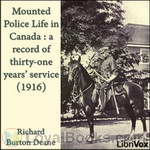 Mounted Police Life in Canada : a record of thirty-one years' service (1916)
Mounted Police Life in Canada : a record of thirty-one years' service (1916)
Learn more about the famous and respected Royal Canadian Mounted Police. This book is the personal recollections of one ‘Mountie’; his life, experiences and trials as an officer in a new frontier – The Canadian Northwest. | |
By: Daisy Ashford (1881-1972) | |
|---|---|
 The Young Visiters, or Mr. Salteena's Plan
The Young Visiters, or Mr. Salteena's Plan
The Young Visiters is a comic romance novella that parodies upper class society of late Victorian England. Social climber Alfred Salteena introduces his young lady friend Ethel to a genuine gentleman named Bernard and, to his irritation, they hit it off. But Bernard helps Alfred in his plan to become a gentleman, which, Alfred hopes, will help him win back Ethel. | |
By: Jacques Futrelle (1875-1912) | |
|---|---|
 Elusive Isabel
Elusive Isabel
Elusive Isabel is a novel by Jacques Futrelle (April 9, 1875 – April 15, 1912) first published in 1909. Set in Washington, D.C., it is a spy novel about an international conspiracy of the “Latin” countries against the English-speaking world with the aim to take over world control. | |
By: P. R. Kincaid | |
|---|---|
 The Arabian Art of Taming and Training Wild and Vicious Horses
The Arabian Art of Taming and Training Wild and Vicious Horses
Back in the day before automobiles, a good horse trainer and veterinarian was the equivalent of “Mr Goodwrench”. A badly behaving or unhealthy equine was equivalent to breaking down on the highway or running out of gas on a lonely stretch of highway somewhere in Utah. My sources tell me that most of the training methods are ok, but stay away from the medical tips unless you are prepared to become the poster boy or girl for the local SPCA. Listen with tongue in cheek, and check with a professional before attempting any of these techniques on a real animal. | |
By: José Rizal (1861-1896) | |
|---|---|
 Noli Me Tangere (The Social Cancer)
Noli Me Tangere (The Social Cancer)
Noli Me Tangere (Latin for Touch Me Not) is a novel by the National Hero of the Philippines, Dr. José Rizal. It was originally written in Spanish, and first published in Germany in 1887. Noli Me Tangere exposed the corruption and abuse of the Spanish government and clergy towards the Philippine people and the ills of the Philippine society. This novel, and its sequel El Filibusterismo were banned in many parts of the Islands. Rizal was later arrested for inciting rebellion, based largely on his writings, and was excuted in Manila... | |
By: Edwin F. Benson | |
|---|---|
 Life in a Mediaeval City, Illustrated by York in the XVth Century
Life in a Mediaeval City, Illustrated by York in the XVth Century
A short and gentle overview of mediaeval life in a large city. It lightly covers the class structure of society, local government, guilds, pageantry and punishment. The author has an easy, rhythmic style which leaves the reader wanting to find out more. | |
By: Carley Dawson (1910-1977) | |
|---|---|
 Mr Wicker's Window
Mr Wicker's Window
When Christopher Mason walked into Mr. Wicker's antique shop, he had no idea he would soon be embarking on a marvellous journey to China to find a wonderful tree made of jewels. He had no idea that Mr. Wicker was a magician and could travel through time. And that the tree was sought by others, not least among them the murderous Claggett Chew, a merchant in port and a pirate on the high seas, who also had knowledge of magic. But before Chris succeeded in quest, he would know of all these things and more... | |
By: E. R. Eddison | |
|---|---|
 The Worm Ouroboros
The Worm Ouroboros
This classic 1922 fantasy novel brings you to a strange and lovely world where a young lord wrestles King Gorice for his land’s freedom, where unscalable mountains can only be conquered by stubbornness and hippogriffs, where the great explorer Lord Gro finds himself continually driven to betrayal, where sweet young women occasionally fall for evil wizards, and where the heroes actually win their hearts’ desire. | |
By: Rebecca West (1892-1983) | |
|---|---|
 The Return of the Soldier
The Return of the Soldier
In 1916 on an isolated country estate just outside London, Captain Chris Baldry, a shell-shocked captain suffering from amnesia, makes a bittersweet homecoming to the three women who have helped shape his life. Will the devoted wife he can no longer recollect, the favorite cousin he remembers only as a childhood friend, and the poor innkeeper’s daughter he once courted leave Chris to languish in a safe, dreamy past–or will they help him recover his memory so that he can return to the front? The answer is revealed through a heart-wrenching, unexpected sacrifice. | |
By: E.D.E.N. Southworth. | |
|---|---|
 The Hidden Hand
The Hidden Hand
“If you will listen to this book, you will meet a cast of unforgettable characters, as different from one another as the sun and moon. But they have one thing in common – all of them hide many, many secrets. The plot of this book is full of twists which may leave you guessing until the end. Bridget’s lively reading adds much to the joy of listening to this book.” (Summary by Stav Nisser) | |
By: Joris-Karl Huysmans | |
|---|---|
 Against the Grain, or Against Nature
Against the Grain, or Against Nature
“THE BOOK THAT DORIAN GRAY LOVED AND THAT INSPIRED OSCAR WILDE”. Such is the enticing epigraph of one early translation of Huysmans’ cult novel of 1884, which is also routinely called the Bible of Decadence. Accurate descriptions, both, of this bizarre masterpiece which has reverberated ever since through high and popular culture. “Against Nature” (or in this version “Against The Grain”) explores to the furthest limit the life of the world-rejecting aesthete living a reclusive existence devoted entirely to artificial paradises of his own devising... | |
By: Charles Foster Kent | |
|---|---|
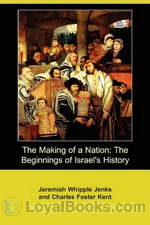 The Making of a Nation: The Beginnings of Israel's History
The Making of a Nation: The Beginnings of Israel's History
Charles Foster Kent was one of the premier scholars in Jewish Studies at the turn of the century. He was particularly well-known for his comparisons of early Christianity to its Jewish roots. He also wrote several distinguished histories of Israel, the Jewish people, Torah studies, and the development of oral Torah. | |
By: Albert Payson Terhune (1872-1942) | |
|---|---|
 His Dog
His Dog
Albert Payson Terhune, perhaps best known for his book Lad, a Dog (later turned into a popular movie), was also a breeder of collies and a journalist. Some of his collie lines survive to this day. His Dog is a story about Link Ferris who finds an injured dog on his way home one evening. Knowing nothing about dogs, Link nurses the dog back to health and the two form a bond such as only can be formed between human and canine. Unable to locate the collie’s owner, Link christens his dog ‘Chum’ who becomes invaluable in tending to the daily needs of his meager farm... | |
By: Albert Payson Terhune (1872-1942) | |
|---|---|
 Bruce
Bruce
Albert Payson Terhune was a journalist but is probably best known as a breeder of dogs, in particular collies at his Sunnybank Kennels. Bruce charts the story of an unwanted puppy who becomes loved by the mistress of the family. He then becomes enlisted as a carrier dog in World War 1, completing heroic tasks and coming home a war hero | |
By: Rose Wilder Lane (1886-1968) | |
|---|---|
 Henry Ford's Own Story
Henry Ford's Own Story
Rose Wilder Lane was a newspaper reporter, free-lance writer, political activist, and the daughter of Laura Ingalls Wilder, author of the "Little House" series of popular children's books. In this biography of Henry Ford, Ms. Lane worked directly with Ford to tell his story from his birth to his founding of the Ford Motor Company and his use of modern assembly lines to mass produce his cars. | |
By: William F. Cody | |
|---|---|
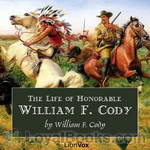 The Life of Honorable William F. Cody
The Life of Honorable William F. Cody
The life and adventures of Honorable William F. Cody–Buffalo Bill–as told by himself, make up a narrative which reads more like romance than reality, and which in many respects will prove a valuable contribution to the records of our Western frontier history. While no literary excellence is claimed for the narrative, it has the greater merit of being truthful, and is verified in such a manner that no one can doubt its veracity. The frequent reference to such military men as Generals Sheridan, Carr, Merritt, Crook, Terry, Colonel Royal, and other officers under whom Mr... | |
By: Stamp Act Congress of 1765 | |
|---|---|
 Declaration of Rights
Declaration of Rights
On June 8, 1765 James Otis, supported by the Massachusetts Assembly sent a letter to each colony calling for a general meeting of delegates. The meeting was to be held in New York City in October. Representatives from nine colonies met in New York. Though New Hampshire, Virginia, North Carolina and Georgia did not send delegates, the Assemblies of those missing colonies nonetheless agreed to support the works of the Congress. The meetings were held in Federal Hall in New York, and the delegates assembled on October 2... | |
By: Lilian Gask | |
|---|---|
 Folk Tales from Many Lands
Folk Tales from Many Lands
A collection of poetic folk tales from all over the world. (Kalynda) | |
By: Marianne Moore (1887-1972) | |
|---|---|
 Poems
Poems
In 1921, American poet H.D. collected and published a selection of previously published poems by Marianne Moore. Although this angered Moore, as it was entirely unauthorized, she later accepted the edition as well made and used it as the basis for her own 1924 publication of Obersvations. Moore’s unique poetry matches the experimentation underway during the American Modernist movement. Much of it incorporates seemingly out-of-place quotations into complex free verse that often uses Nature as a subject matter... | |
By: Mack Reynolds (1917-1983) | |
|---|---|
 Mercenary
Mercenary
Every status-quo-caste society in history has left open two roads to rise above your caste: The Priest and The Warrior. But in a society of TV and tranquilizers--the Warrior acquires a strange new meaning... (Introduction from the Gutenberg text) | |
 Ultima Thule
Ultima Thule
Ronny Bronston has dreamed all his life of getting a United Planets job that would take him off-world. He finally gets the opportunity when he is given a provisional assignment with Bureau of Investigation, Section G. But will he be able to complete his assignment and find the elusive Tommy Paine? | |
By: Dallas McCord Reynolds (1917-1983) | |
|---|---|
 Status Quo
Status Quo
Larry Woolford is a government agent, tasked with investigating subversive activity. He does everything an ambitious young man should do if he wants to succeed: wear the right clothes, listen to the right music, even drink vodka martinis. Then he stumbles across a conspiracy of Weirds plotting to overthow the entire existing social order. It's a race against time. Can he stop their fiendish plan, and keep America safe for shallow judgements based on status symbols? Status Quo was nominated for the 1962 Hugo Award for short fiction. | |
By: LibriVox volunteers | |
|---|---|
 The Yellow Sheet – the NaNoWriMo project 2007
The Yellow Sheet – the NaNoWriMo project 2007
An atomic bomb explodes in the mountains of Montana. But was there really a bomb? And was it really in Montana, or in Tokyo? Are Liz and Elizabeth the same woman, is she married with children, is her husband a spy? | |
By: Margaret Warner Morley (1858-1923) | |
|---|---|
 The Insect Folk
The Insect Folk
Through delightful outings with her students, a teacher introduces her class to the fascinating world of insects. She encourages her students to observe and ask questions. This is a wonderful science text for young children. | |
By: Cornelia Mee | |
|---|---|
 Exercises in Knitting
Exercises in Knitting
Mrs. Mee, her husband, and her sister ran a yarn and needlework import/warehouse business in Bath, England. Her books primarily contain practical everyday items that knit up quickly with the busy homemaker in mind. At this time, published knitting “receipts” did not contain abbreviations and were laborious to use. They were, however, rich in error! Later in her career, due to circumstances of war and the resulting social stress and poverty, many of her knitting books were printed for ladies’ charitable societies, which used her knitting “receipts” to clothe the poor mill workers who were out of work due to the American Civil War and the embargo of cotton. | |
By: Gotthold Ephraim Lessing (1729-1781) | |
|---|---|
 Miss Sara Sampson
Miss Sara Sampson
G.E. Lessing, widely regarded by students of theater as the world's first dramaturg, was also one of the first proponents of the German bourgeois tragedy. Miss Sara Sampson, in which a young woman runs off with a ne'er-do-well who is still entangled with his former mistress, was a reaction against the Voltarian verse drama popular in the eighteenth century. | |
By: Isabella L. Bird | |
|---|---|
 The Englishwoman in America
The Englishwoman in America
Isabella Bird travels abroad in Canada and the United States in the 1850s. As an Englishwoman and a lone female, she travels as far as Chicago, Prince Edward Island, and Cincinatti. Her observations on the trials and tribulations of the journeys are astute, if formed by her place and time in history. Adventures with pickpockets, omnibuses, cholera, and rat invested hotels deter her not. (Sibella Denton) | |
By: Lao Tzu | |
|---|---|
 Laotzu's Tao and Wu Wei
Laotzu's Tao and Wu Wei
The classic of the Way and of High Virtue is the Tao Teh Ching. Its author is generally held as a contemporary of Confucius, Lao Tzu, or Laozi. The exact date of the book’s origin is disputed. The book is divided into two parts, the Upper Part and the Lower Part. The Upper Part consists of chapters 1-37, and each chapter begins with the word “Tao,” or the Way. The Lower Part consists of chapters 38-81, and each chapter begins with the words “Shang Teh,” or High Virtue. This 1919 edition names the Lower Part as the Wu Wei, or translated variously as “not doing,” “non-ado,” or “non-assertion... | |
By: D. H. Lawrence (1885-1930) | |
|---|---|
 Aaron's Rod
Aaron's Rod
Flutist Aaron Sisson is caught up in the aftermath of WWI. A lost soul, he attempts to find himself in the comfort of bar-room talk and alcohol and a woman. Moving on, he spends time with a mining executive's relatives. But he finds the family a stuffy middle-class lot, bored with each other and themselves. He leaves his wife and children and strikes out for the open road. During a playing engagement at an opera performance, he reunites with the mining executive's family. Talk is of love and war, none of it very satisfying to anyone... | |
 Lost Girl
Lost Girl
"There is no mistake about it, Alvina was a lost girl. She was cut off from everything she belonged to." In this most under-valued of his novels, Lawrence once again presents us with a young woman hemmed in by her middle-class upbringing and (like Ursula Brangwen in The Rainbow) longing for escape. Alvina Houghton's plight, however, is given a rather comic and even picaresque treatment. Losing first her mother, a perpetual invalid, and later her cross-dressing father, a woefully ineffectual small-scale entrepreneur, Alvina feels doomed to merge with the tribe of eternal spinsters who surround her in the dreary mining community of Woodhouse... | |
By: Maturin Murray Ballou | |
|---|---|
 The Sea-Witch
The Sea-Witch
Maturin Murray Ballou was the author of dozens of books, chiefly centered around his extensive sea travel. He was deputy navy-agent in the Boston Custom House and circumnavigated in 1882, collecting material for several travel accounts and various nautical romances, amongst which The Sea-Witch can be counted. | |
By: George L. Apperson (1857-1937) | |
|---|---|
 The Social History of Smoking
The Social History of Smoking
This work tells the history of smoking in England from the social point of view. Thus it does not deal with the history of tobacco growing or tobacco related manufacture, but is rather the story of how smoking has fitted in with the fashions and customs throughout the ages, and the changes in the attitude of society towards smoking. | |
By: Pu Songling (1640-1715) | |
|---|---|
 Strange Stories From a Chinese Studio
Strange Stories From a Chinese Studio
MANUAL OF SURGERY, OXFORD MEDICAL PUBLICATIONSBY ALEXIS THOMSON, F.R.C.S.Ed.PREFACE TO SIXTH EDITION Much has happened since this Manual was last revised, and many surgical lessons have been learned in the hard school of war. Some may yet have to be unlearned, and others have but little bearing on the problems presented to the civilian surgeon. Save in its broadest principles, the surgery of warfare is a thing apart from the general surgery of civil life, and the exhaustive literature now available on every aspect of it makes it unnecessary that it should receive detailed consideration in a manual for students... | |
By: Edward George Bulwer-Lytton (1803-1873) | |
|---|---|
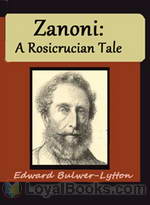 Zanoni
Zanoni
Zanoni, a timeless Rosicrucian brother, cannot fall in love without losing his power of immortality; but he does fall in love with Viola Pisani, a promising young opera singer from Naples, the daughter of Pisani, a misunderstood Italian violinist. An English gentleman named Glyndon loves Viola as well, but is indecisive about proposing marriage, and then renounces his love in order to pursue occult study. The story develops in the days of the French Revolution in 1789. Zanoni has lived since the Chaldean civilization... | |
By: Edmond Hamilton | |
|---|---|
 The Stars, My Brothers
The Stars, My Brothers
Edmond Hamilton (1904 – 1977) had a career that began as a regular and frequent contributor to Weird Tales magazine. The first hardcover publication of Science Fiction stories was a Hamilton compilation, and he and E.E. “Doc” Smith are credited with the creation of the Space Opera type of story. He worked for DC Comics authoring many stories for their Superman and Batman characters. Hamilton was also married to fellow author Leigh Brackett. – Published in the May, 1962 issue of Amazing Stories “The Stars, My Brothers” gives us a re-animated astronaut plucked from a century in the past and presented with an alien world where the line between humans and animals is blurred. | |
By: St. Ignatius of Antioch | |
|---|---|
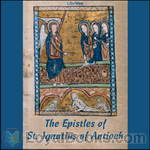 The Epistles of Ignatius
The Epistles of Ignatius
Ignatius of Antioch penned these letters to churches (Ephesians, Magnesians, Trallians, Romans, Philadelphians, and Smyrnaeans) and Polycarp on his way to martyrdom. Ignatius was an apologist for the Episcopal style of church government (as opposed to sole rule by a council of presbyters) which developed in the late first or early second century. Eager to die in imitation of his Savior, it was Ignatius who wrote this to the Roman church: “I am God’s wheat, and I am ground by the teeth of wild beasts that I may be found pure bread [of Christ].” | |
By: David Barrows | |
|---|---|
 A History of the Philippines
A History of the Philippines
This book is one of the earliest studies of Philippine history by an American scholar. In preparation for this book, the author conducted ethnological studies of indiginous island tribes after the American war in the Philippines. Since this book was intended for the Philippine reader, the author nicely places the history of the Islands into the broader context of European and American history. | |